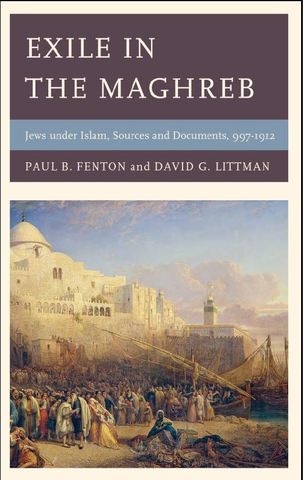In January 2015 the Qatar-owned satellite channel al-Jazeera broadcast a programme about Jews in Morocco. "Jews first began to settle in Morocco over 2, 000 years ago," said the presenter."... and for centuries they and Muslims have happily co-existed there." Now the English version of a compilation of commented original documents, L'Exil du Maghreb, mainly but not exclusively found in Jewish sources, will provide a corrective to this common historical distortion. Professor Paul Fenton, director of Hebrew and Arabic studies at the Sorbonne, gave a Harif/Spiro Ark lecture about his book, written jointly with the late historian David Littman. Report by Lyn Julius.
The makers of the Al-Jazeera programme might never have heard of the fanatical Almohades, who ruled Morocco for 250 years in the 13th century and invaded Spain, causing many Jews to flee. Fundamentalist Almohad rule led to Christianity being wiped out in the Maghreb. Many Jews such as Maimonides converted to Islam on pain of death in the Middle Ages, if only for a short time - according to some historians.
When conditions later improved under the Marinids, converts reverted back to Judaism. Sephardi Jews from Spain came to settle in the coastal towns of Morocco, but one group headed for the deep south - the city of Touat.
These commerce-minded, cultivated Jews soon established a thriving presence in Touat. They set about building synagogues. One even overlooked a mosque, in violation of traditional rules.
What they did not reckon with, in the fateful year of 1492, was the arrival in Touat of a cleric from Tlemcen (in present-day Algeria): Muhammed al-Karim al -Maghili.
Al-Maghili, who was instrumental in converting large numbers of Africans in the south of Morocco to Islam, was shocked by the Jews he saw in Touat. He wrote an epistle to the local chieftains calling on them to destroy the synagogues and expel those swine Jewish infidels, or enslave them. (The epistle is among the documents featured in Exile in the Maghreb.)
This the chieftains did.
It is a sorry sign of how intolerant of minorities were the theologians of the al-Maliki school of Islam in the Maghreb until the colonial era, that one of the first things they published when the printing press came to Morocco in the 19th century, was not a scientific tract, or even the Koran, but the Epistle against the Jews which al-Maghili wrote to the chieftains of Touat five centuries earlier.
Maghreb scholars preserved a strict interpretation of the dhimmi laws which governed the relationship of Jews and Muslims under the 8th century Pact of Omar. The Arab prophet of Islam Muhammad had spared the lives of the defeated Jews and Christians as 'People of the Book', rather than put them to the sword, but they had to abide by rules denoting their subjugation and inferiority to Muslims.
Following codification in the 13th century by the literalist theologian Ibn Taymiyya, 'Dhimmi' acquired a precise meaning in Islamic jurisprudence: non-Muslims would be 'protected' by Muslims in return for a capitation or poll tax. This begs the question - protected against whom?
Violent mobs singled out the Jewish 'Other' for attack and looting. Jews would 'cop it' at times of political turmoil or trouble.
Jews could not build new synagogues or repair them without permission; they had to allow Muslims to enter them at will. Jewish homes had sometimes to be painted red or blue, even after Jews had been permitted in modern times to move out of the Jewish mellah into the medina.
Jews were forbidden from teaching their children the Koran. This was to prevent Jews engaging in theological polemics with Muslims.
Jews had to wear special badges and black attire. A Jew's djellaba was worn awkwardly 'off the shoulder' for maximum discomfort. Jews were not permitted to blow the ram's horn (shofar) in a public place. The Palestinian Mufti of Jerusalem would use this pretext to incite anti-Jewish riots in 1929.
Jews could be accused of insulting Islam on the slightest pretext - so they avoided including 'Allah' in their greetings in case they were overheard and misinterpreted. The penalty was conversion to Islam. For 600 years, and as late as 1890, Jews had to submit to a humiliating slap on the neck when they handed over the jizya or poll tax.
It was to help overcome these arbitrary and degrading rules, recorded by 19th century travellers and reported by the teachers of the Alliance (AIU) schools network, founded in 1860, that the AIU, the Anglo-Jewish Association, and their German-Jewish counterpart, determined to improve the lot of the Jews of the Middle East and North Africa, primarily through education.
There was almost no escape unless a Jew managed to obtain a foreign passport. As go-betweens, translators or agents of European powers, Jews demanded colonial protection. The Jews of the port of Mogador were lucky enough to hold British passports.
Exile in the Maghreb consists of a wealth of original documents amassed by David Littman. He found them in the archives of the Anglo-Jewish Association, the Alliance Israelite Universelle (AIU) and British foreign office documents. The Alliance teachers felt it was their duty to get better legal protection for their Jews, even at the cost of their lives.
The myth persists that the Jewish communities at the heart of the Ottoman empire were better treated than the Jews in the Maghreb. Conditions were generally less harsh because the Jews were among several minorities, and the Christians bore the brunt of any popular violence. However, Professor Fenton did come across one document where Jews in Safed complained to the Ottoman sultan that the local Pasha was making them clear animal refuse on Shabbat. Jews could even be required to do chores on Yom Kippur, the holiest day in the Jewish calendar.
As for the myth that Islam was more tolerant of Jews than Christendom, Professor Fenton pointed out that more Jews (3,000) had been massacred in Granada, Spain, in 1066 - in a Muslim backlash against the Jewish vizir Joseph ibn Naghrela - than lived in the Rhineland towns of Speyer, Worms and Mainz during the Crusades.




